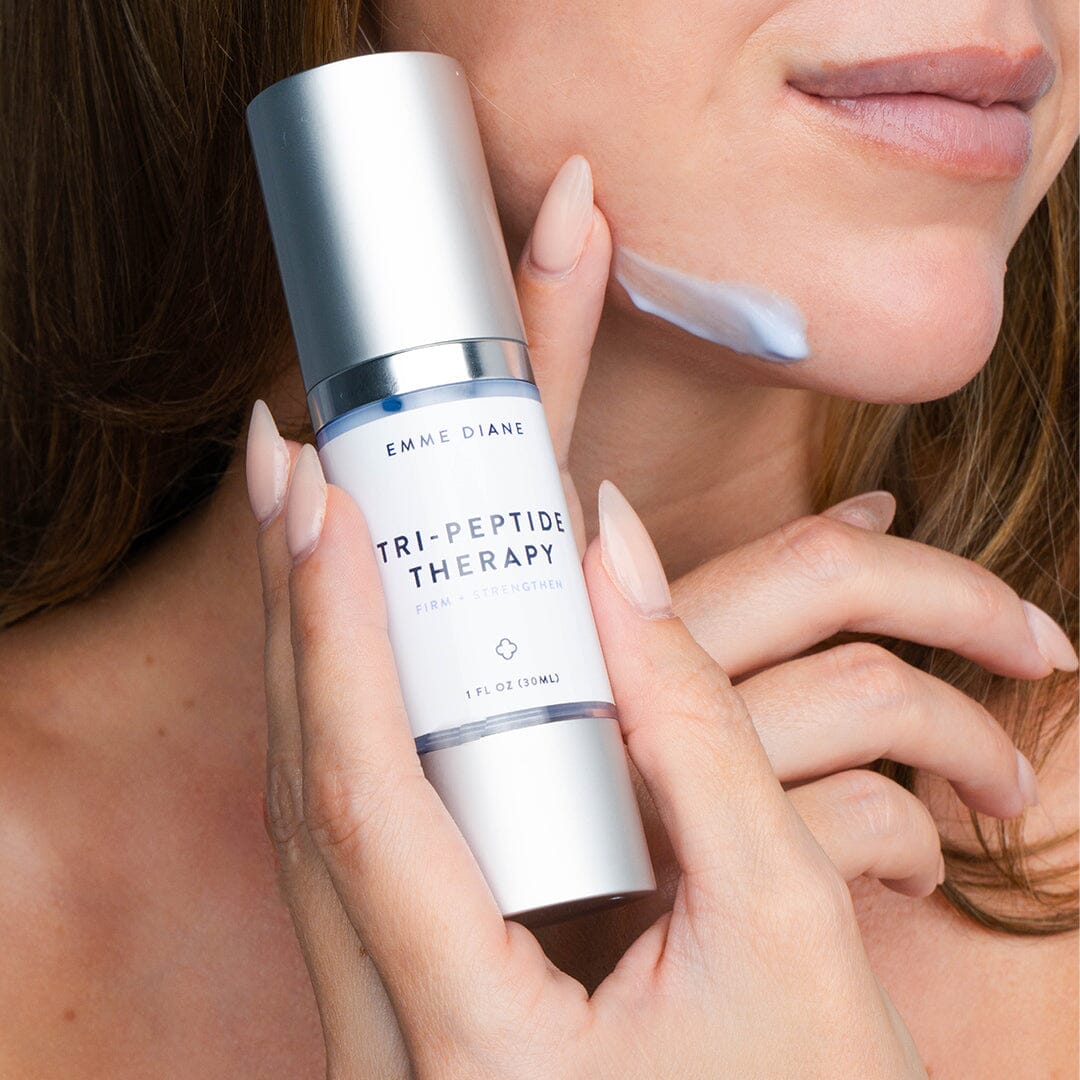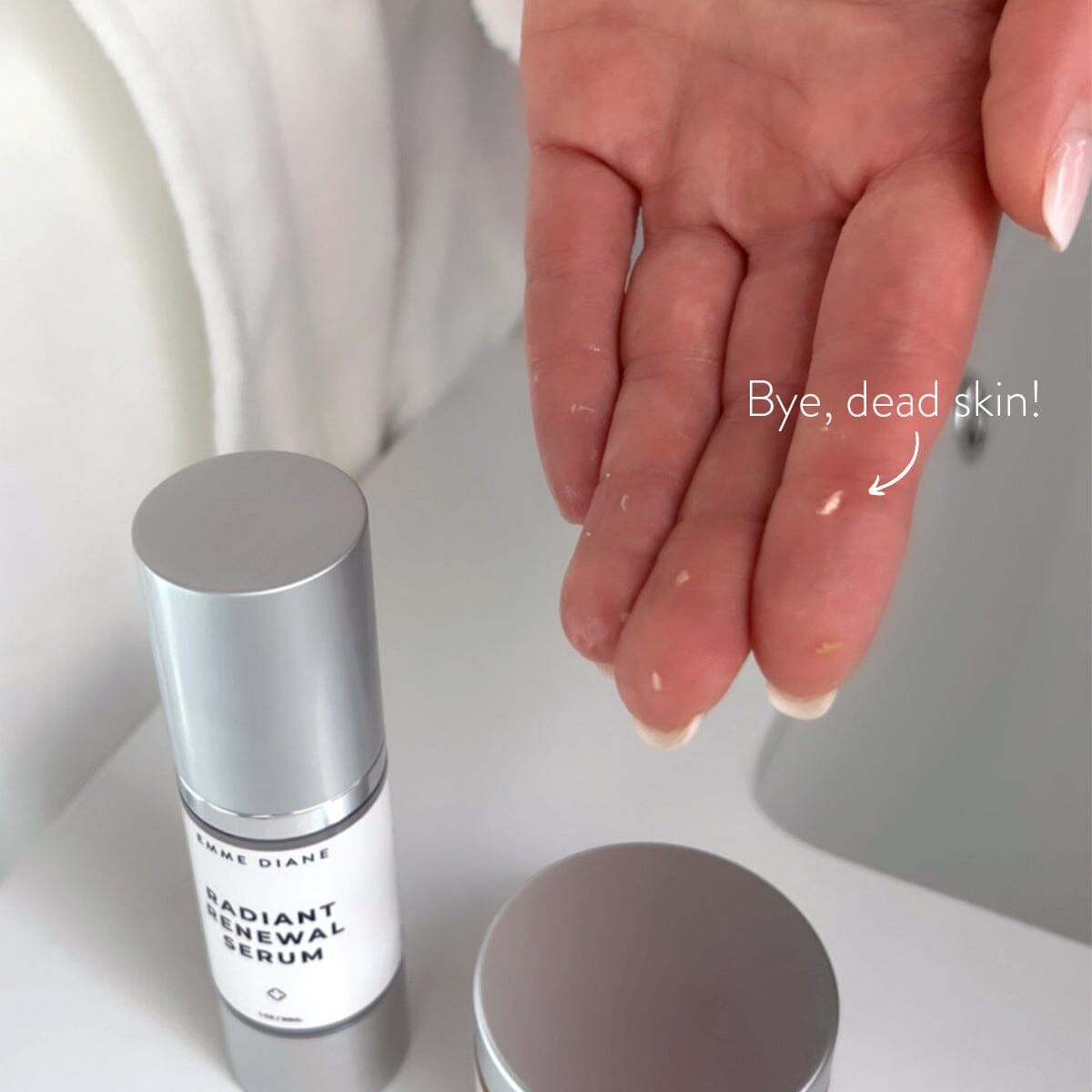Could Your Tummy Trouble Be Showing Up On Your Skin?
by Emily Linehan on September 15, 2022
If you’re a client of mine you likely already know that the foods we eat can impact our skin. However, the correlation between our skin and gut goes much deeper than just the foods we consume. In fact, studies have shown that our gut microbiome (the good and bad bacteria) is a major regulator of the gut-skin axis and has an effect on several skin conditions [1]. In addition, gut imbalances can be one of the main causes of adult acne. Therefore, if you want to heal your skin, you may have to heal your gut first.
The Gut-Skin Axis
The gut is responsible for so many processes throughout the body, like digestion, hormone regulation, nutrient absorption, and more. In addition, the gut houses 70% of our immune system, therefore it needs the right environment to flourish. Since the gut plays such an important role in maintaining homeostasis throughout the body, it’s not surprising that an imbalance can impact other organs, including our skin.
Your gut and skin are in constant communication with each other through what is called the “gut-skin axis”. Similar to how our gut communicates with other areas of our body, much of the communication happens via our microbiome. Our microbiome includes trillions of bacteria, fungi, viruses, and other living organisms that can produce different metabolites (substances produced during metabolisms, such as digestion or other chemical processes) that either benefit us or cause us harm. While they are found throughout our body, the largest numbers are found in the small and large intestines, as well as on the skin.
How Gut Health Affects Our Skin
Gut microbiome imbalances, consuming foods that provoke inflammatory responses, digestive issues, and more can lead to a variety of gut issues, including one known as ‘leaky gut’. Leaky gut occurs when there is damage to the intestinal lining that is responsible for the passing of various substances from the gut into the blood. The damage can create ‘gaps’ in the cell wall that allows for increased intestinal permeability, meaning toxins, microbes, and other metabolites enter the bloodstream.
When toxins or other metabolites that would have otherwise been excreted enter the bloodstream, this can lead to a variety of issues and strain the liver. It can also cause inflammation, which is linked to several skin conditions including acne, rosacea, eczema, and more.
Not only can leaky gut allow for toxins we don’t want to hang around, but it can also prevent good things, like nutrients, vitamins, and minerals that are vital for healthy, glowing skin from being properly absorbed and retained.
According to Dr. Marcelo Campos, “we all have some degree of leaky gut”, this is because the barrier is not completely impenetrable and isn’t supposed to be. However, some of us may be more sensitive to conditions such as leaky gut due to our genetics or lifestyle factors. Although it’s unclear exactly how many Americans are suffering from leaky gut or related conditions, some studies [2] have found that increased intestinal permeability is connected to multiple chronic diseases including Celiac Disease, Diabetes, Crohn's Disease, Irritable Bowel Syndrome (IBS), and food allergies.
Imbalances with the gut microbiome can cause imbalances with hormones as well. And unfortunately, hormones, or a hormonal imbalance, can be one of the biggest acne triggers.
Aside from leaky gut, several studies [3] have shown that other problems within the gut are closely associated with skin disorders. For example, a 2008 study [4] found that Rosacea patients have a significantly higher SIBO (Small Intestinal Bacterial Overgrowth) presence than others. In addition, Candida Overgrowth Syndrome can also present on the skin as acne, a skin infection, or irritation. (Although candida is generally harmless, if an imbalance occurs it can cause or intensify leaky gut or inflammation.)
How to Care For Your Gut
Since the gut is such a complex ecosystem, ensuring that it is functioning properly is key. Infections, illnesses, diet, certain medications, hormonal birth control, stress, and disruptions with sleep, among other things, can all contribute to imbalances. However, there are some ways to help care for your gut, which we will dive into below.
Eat Real Food
As we’ve discussed previously, the foods we eat can have a big impact on our gut and skin. This is why it’s so important to eat real, nutritional food that doesn’t contain harmful substances like chemicals, trans fats, excess sodium, and refined sugar. In addition, eating fermented foods like sauerkraut, kimchi, and (non-dairy) yogurt can benefit your gut microbiome as they contain probiotics that help rebuild gut and skin health. Bone broth, collagen, and gelatin can also have a positive impact on our digestive system since they help support the connective tissues that form the intestinal lining (which when damaged, can lead to leaky gut syndrome).
Prebiotics and Probiotics
Probiotics (which can be found in the foods mentioned above) are vital for rebuilding gut and skin health. Unfortunately, most probiotics are unable to survive the harsh environment of our stomach, making them ineffective. Therefore, taking a spore-based probiotic* with your first meal of the day can help support gut health. It’s important to note that since our stomach is a harsh environment, your probiotic shouldn’t need to be refrigerated as it’s unlikely to survive long enough in the body to get to where it needs to be.
After beginning with probiotics, you can also introduce prebiotics which helps ensure the longevity of the good bacteria in your gut. Some prebiotic-rich foods include cooked and cooled potatoes, onions, barley/oats, citrus fruits, apples, asparagus, chia and hemp seeds, chicory root, dandelion greens, green bananas, and garlic.
*Note: Always check with your health care professional before starting or stopping any supplements. If you have SIBO, do not take a probiotic until instructed to do so by your doctor as it can grow the bacteria in the small intestine.
Optimize Digestion
You could eat the most gut-friendly foods, however, if your body is not absorbing the necessary nutrients it won’t matter. This is why optimizing the digestive process is crucial! Here are a few tips to help with digestion (but always check in with your doctor before starting any new supplements) -
- Take a digestive enzyme with every meal to enhance the digestive process. This is especially helpful when consuming bigger meals or meals with meat.
- Always chew food thoroughly to ensure carbohydrates are properly broken down. Chewing produces salivary enzymes which are needed to break down carbs, so properly chewing your food (even smoothies) is necessary. Your food should be liquidy before swallowing!
- Drink Apple Cider Vinegar diluted in water 15 minutes before a meal to help support stomach acid (Hydrochloric Acid). If there is not enough stomach acid, proteins are unable to break down fully, therefore we won’t get the amino acids. Digestive bitters such as Urban MoonShine, Thorne Bio-Gest, Now Foods Super Enzymes, and others can also help support stomach acid.
- Drink warm water with lemon in the morning and before each meal. Lemon is detoxifying and helps stimulate bile production which aids digestion.
- Take an Ox bile supplement, such as Thorne Bio-Gest to support fat digestion. Some indicators of poor fat digestion include feeling nauseous or sick after having a high-fat meal or having mucous present in your stool.
- Eat in a parasympathetic (“rest and digest”) state. Since the parasympathetic nervous system is necessary to regulate digestion, ensuring you’re eating in a relaxed state is important to ensure you utilize nutrients effectively. Try completing some deep breathing exercises a few minutes before you begin eating and avoid eating at your desk or on the go to ensure you enter a parasympathetic state.
Seek Professional Help
Aside from presenting as skin issues, signs of a gut imbalance can also include mood swings, bloating, constipation, heartburn, autoimmune conditions, unintentional fluctuations in weight, memory problems, joint pain, and more. So, if you want to clear your skin, or if you suspect that your gut may be causing other issues, I highly recommend you reach out to your doctor or naturopath. By working with a professional, they can get to the root cause of your problem (such as food intolerances or other diseases) and devise a treatment plan to help safely heal your gut.
xoxo, Emme
Disclaimer: This information is for educational purposes only and does not take the place of medical advice. These statements are not intended to diagnose, treat, cure, or prevent any disease. You should always consult with a healthcare professional before starting any health plan or taking supplements.
Citations
[1] Salem I, Ramser A, Isham N and Ghannoum MA (2018) The Gut Microbiome as a Major Regulator of the Gut-Skin Axis. Front. Microbiol. 9:1459. doi: 10.3389/fmicb.2018.01459
[2] Fasano A. Intestinal permeability and its regulation by zonulin: diagnostic and therapeutic implications. Clin Gastroenterol Hepatol. 2012 Oct;10(10):1096-100. doi: 10.1016/j.cgh.2012.08.012. Epub 2012 Aug 16. PMID: 22902773; PMCID: PMC3458511.
[3] Bowe WP, Logan AC. Acne vulgaris, probiotics and the gut-brain-skin axis - back to the future? Gut Pathog. 2011 Jan 31;3(1):1. doi: 10.1186/1757-4749-3-1. PMID: 21281494; PMCID: PMC3038963.
[4] Parodi A, Paolino S, Greco A, Drago F, Mansi C, Rebora A, Parodi A, Savarino V. Small intestinal bacterial overgrowth in rosacea: clinical effectiveness of its eradication. Clin Gastroenterol Hepatol. 2008 Jul;6(7):759-64. doi: 10.1016/j.cgh.2008.02.054. Epub 2008 May 5. PMID: 18456568.


